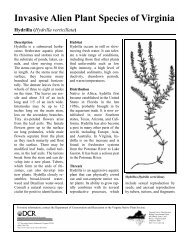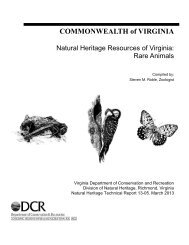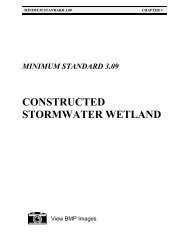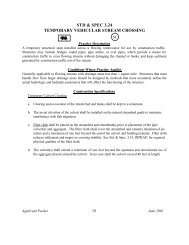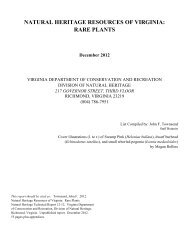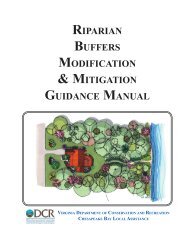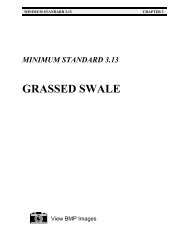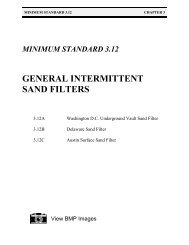APPLICANT PACKET - Virginia Department of Conservation and ...
APPLICANT PACKET - Virginia Department of Conservation and ...
APPLICANT PACKET - Virginia Department of Conservation and ...
You also want an ePaper? Increase the reach of your titles
YUMPU automatically turns print PDFs into web optimized ePapers that Google loves.
approval on behalf <strong>of</strong> the <strong>Virginia</strong> Soil <strong>and</strong> Water <strong>Conservation</strong> Board. Section 10.1-563D <strong>of</strong><br />
the Law discusses this requirement.<br />
7. Mining <strong>and</strong> Drilling: The Law does not regulate surface or deep mining <strong>of</strong> coal or other mineral<br />
resources or exploration or drilling for gas or oil including the well site, roads, feeder lines, <strong>and</strong><br />
<strong>of</strong>f site disposal areas. These activities are subject to rules established under the <strong>Department</strong> <strong>of</strong><br />
Mines, Mineral, <strong>and</strong> Energy (DMME) <strong>and</strong> applicable federal regulations.<br />
8. Shore Erosion Control Projects: Shoreline erosion control projects in tidal waters are exempt<br />
provided they are approved by local wetl<strong>and</strong>s boards, the <strong>Virginia</strong> Marine Resources<br />
Commissions (VMRC), the <strong>Virginia</strong> <strong>Department</strong> <strong>of</strong> Environmental Quality (DEQ), or the U.S.<br />
Army Corp <strong>of</strong> Engineers. These projects must comply with any permit requirements for<br />
conserving natural resources issued by these regulating agencies. VMRC coordinates the Joint<br />
Permit Application process for projects operating in state waters <strong>and</strong> wetl<strong>and</strong>s.<br />
PROGRAM AUTHORITY FOR PRIVATE AND PUBLIC PROJECTS<br />
The Law indicates that the Program Authority for a specific l<strong>and</strong>-disturbing activity is dictated by<br />
who owns the l<strong>and</strong> on which an activity will be undertaken. The discussion below outlines the four basic<br />
types <strong>of</strong> projects <strong>and</strong> the government entity who serves as the regulatory authority.<br />
1. Private: L<strong>and</strong>-disturbing activities on private l<strong>and</strong>s must be covered by an ESC plan approved<br />
by the locally operated ESC Program in the jurisdiction in which activity is undertaken. As<br />
previously mentioned, municipal water <strong>and</strong> sewer construction projects are regulated at the<br />
local level. The local ESC Program is responsible for program administration, plan review <strong>and</strong><br />
approval, site inspection, complaint response, <strong>and</strong> enforcement on these projects.<br />
2. Multi-jurisdictional: L<strong>and</strong>-disturbing activities that cross local jurisdictions may be regulated at<br />
either the local or state level. The applicant has the option <strong>of</strong> submitting the ESC plan to each<br />
locality involved, or to DCR. Inspection <strong>and</strong> enforcement is generally carried out at the local<br />
level.<br />
3. State: Construction projects on state agency l<strong>and</strong> must be covered by an ESC plan or annual<br />
specifications approved by DCR. Plans must be consistent with local requirements that are<br />
more stringent than the state program. DCR is responsible for plan review <strong>and</strong> approval, site<br />
inspection, complaint response, <strong>and</strong> enforcement on these projects.<br />
4. Federal: Construction projects on federal l<strong>and</strong>s must comply with the Law <strong>and</strong> applicable<br />
federal nonpoint source pollution programs on all regulated l<strong>and</strong> disturbing activities in the<br />
Commonwealth. The Law gives the <strong>Virginia</strong> Soil <strong>and</strong> <strong>Conservation</strong> Board <strong>and</strong> local ESC<br />
programs the authority to cooperate <strong>and</strong> enter into agreements with federal agencies to facilitate<br />
ESC compliance. As with state projects, plans must be consistent with local requirements that<br />
may be more stringent than the state program. The federal agency is responsible for achieving<br />
compliance through separate agreements/contracts with on site developers, regular field<br />
inspection, prompt enforcement action against non-compliant projects, <strong>and</strong>/or other<br />
mechanisms consistent with agency policy.<br />
Applicant Packet 5<br />
June 2001



